If you’ve been around The Niche for any amount of time, then you’re at least peripherally aware of The Dynamic. But you probably have questions. What is an Absolute Nightmare? What is a Sweaterboy? How do you know which one you are? How does one distinguish The Dynamic from other, lesser dynamics?
All of these questions call for a comprehensive explainer, and I have some free time on my hands for the first time in aeons, so I am going to take it upon myself to now create that explainer. By the end of this article, you will know what The Dynamic is.

The Dynamic is that thing when you’re with someone, and you love them and they know it, and they love you and you know it, but it’s a party, and you’re both talking to other people, and you’re laughing and shining, and you look across the room and catch each other’s eyes, but not because you’re possessive, or it’s precisely sexual, but because that is your person in this life… It’s this secret world that exists right there in public, unnoticed, that no one else knows about.
— Greta Gerwig
The Dynamic: Historical Background
Have you watched the Netflix reboot of Queer Eye yet? If not, you should, because it’s amazing. But if you have seen it, remember that scene in the first episode where Bobby Berk, the interior decorator, starts talking about his marriage? And Tom, the lonely dump-truck driver who is being made over, very cheerfully asks, “Who’s the husband and who’s the wife?” And there’s a little ripple of discomfort, and then Bobby is very cheerfully like, “Well, let’s unpack this! We’re both the husbands!”
It ultimately comes off as exactly the kind of sweet teachable moment that Queer Eye was created to facilitate. But it’s also a potent illustration of the pervasiveness of the idea that, in every relationship, there must be a Man and a Woman, a Husband and a Wife. Queer people have long created their own categories to subvert these traditional roles, which aggravates straight people to no end and leads to all kinds of messy shit, like the notion of butches having “masculine privilege,” or that one time Michaela Coel issued a tweet “for my women and my bottom/versatile.” No, bottoms are not The Woman; no, butches are not The Man. The situation, in the words of Rachel Bloom, is a lot more nuanced than that.
But when we — and by “we,” I mean, “gay people” — interact with media, none of the above categories are actually of any use to us.
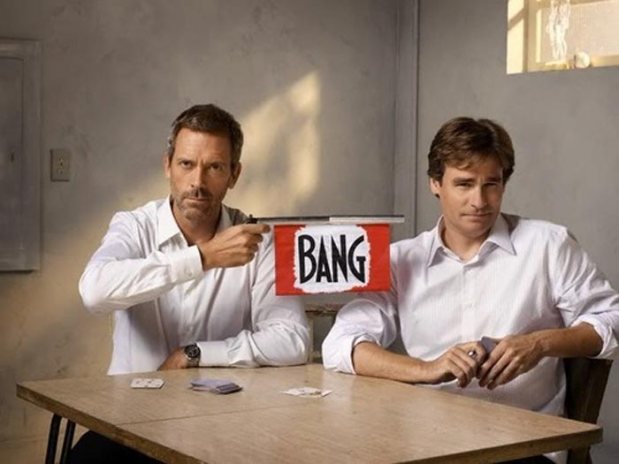
Let’s say you’re watching, I don’t know, House M.D. And you’re enamoured of House and Wilson’s soul-bond. Now, because House is a show written by straight people in the mid-2000s, they’re not actually a couple; they just do #BroThings like living together and proposing marriage to each other and faking their own deaths to ride off into the sunset on motorbikes together at the end of the series. If you’re queer, you probably have your own personal House — some mainstream thing with a secret voice that spoke to you. So you know that House and Wilson, and the countless fictional relationships like them, exist in this weird, liminal space: not a Man and a Woman, and thus not allowed a textual romance; clearly in love, but trapped in media properties that are totally oblivious to gay relationships and communities and identifying terminology. We’re never going to get a portrayal of a butch/femme relationship from the mainstream. We’re never going to get plain articulation of who’s topping and who’s bottoming. Straight writers don’t get how this works. They don’t get how any of this works. Remember that one lesbian sex scene on Wynonna Earp?
That is how straight people think this works. Hahahahahahahahaha. Jesus.
So what us homos have been doing for years when we interact with the hetero mainstream is, like, “Oh, obviously the loud, extroverted one is the top, and the quiet, reserved one is the bottom,” because we have to write porn somehow, and equating man/top/butch and woman/bottom/femme is like… right there, and it’s easy. But it also sucks, for feminist reasons, and for gay rights reasons, and for cissexism reasons, and also just because it’s so uncreative. It’s so unimaginative.
Don’t you wish there were a better way?
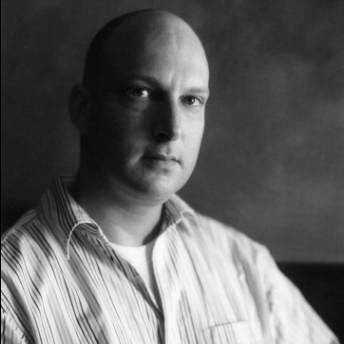
So here is The Dynamic: words on a page, the voice that wants to be a hand, the bridge with no opposite side. Of all the people reading this, are you one of them? I have to believe you are. Sure, we invent each other. We agreed to that a long time ago. Train and trainstation, force and field. We do what we do and what I do is put the pies on the windowsill. So here you are, reading this, expecting something… You’re ready and I’m ready too. Have you been waiting long?
— Richard Siken
The Dynamic: Origins
So last summer I was at Bellwoods Brewery with Harry and Ashleigh and I’d had, like, one cherry cider, which was enough to get me good and drunk because I never drink. And we were sitting on this gorgeous patio eating all this gorgeous food, and the conversation turned, as it often does when Harry and Ashleigh are around, to House M.D. And Harry was just casually like, “The whole thing is a Sherlock Holmes tribute.” And I was like, “Wait, what?” And Harry was like, “Holmes and Watson? House and Wilson?” And I just started screaming out loud on this patio, and Harry and Ashleigh scooped me up and took me on an hour-long walk home to sober me up as, all the while, I kept repeating, “Holmes and Watson… House and Wilson…” I don’t even watch Sherlock! I don’t even watch House M.D.! My mind was blown anyway!

So when The Dynamic was first developed, it was sort of just a fun little game to point out places where writers were obviously paying tribute to Sherlock and Watson. Stuff like House/Wilson::Holmes/Watson, or Dennis doing shitty onscreen deductions on Always Sunny. But, of course, Sherlock remains a point of controversy, to put it bluntly, and it soon became evident that The Dynamic as it had been articulated had much broader applications than just making infinite Sherlock AUs. Kim Kardashian and Kanye West, for instance, are The Dynamic, and yet it’s kind of inscrutable to say that Kim is The Holmes Archetype and Kanye is The Watson Archetype. So the time came to define The Dynamic wholly independently of Sherlock, because The Dynamic is not, ultimately, about any one story; it’s about true love.
The Dynamic: A Definition
In essence, The Dynamic is a series of common traits shared by certain well-written fictional relationships, or well-matched real relationships. It is a fixed point in a changing age, a good and kind and loving bulwark against a cruel, uncaring world. The Dynamic comprises two people in two distinct roles: an Absolute Nightmare, and a Sweaterboy. (Note that “Sweaterboy” is a gender neutral term — Rory Gilmore is a Sweaterboy, as is Abbi from Broad City, but you can definitely say “Sweatergirl” or “Sweaterperson,” or whatever.) It’s a distinctly queer way of understanding and describing relationships, but people of any genders can form The Dynamic. (Again: Kimye.) These terms aren’t merely stand-ins for other, more traditional ways of describing the members of a partnership, like Bottom and Top, or Butch and Femme. They support those categories, and they transcend them.
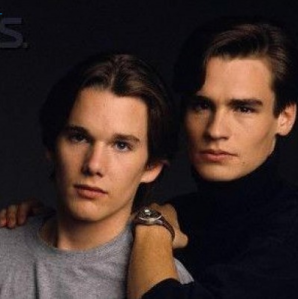
The essence of The Dynamic is that the Sweaterboy has settled sustainably, though unhappily, into heteronormative life when he meets the Absolute Nightmare, while the Absolute Nightmare has entirely rejected the task of trying to pass as heterosexual or normatively masculine or neurotypical, so in a certain sense he’s freer than the Sweaterboy, but in another sense he’s even more lonely and isolated because his abnormality makes him a social outcast. And then, over the course of their relationship, the Sweaterboy becomes more comfortable with himself and the Absolute Nightmare becomes more emotionally open and less isolated. It’s like they have to be freed from the two contrasting pitfalls that queer people trying to survive in normative society often fall into, and the key to both of their escapes is each other.
— Seph
What is An Absolute Nightmare?
We’re just going to get this over with up top: the term “Absolute Nightmare” originated in a comment on The Toast (R.I.P.) about whether or not Sherlock Holmes would enjoy pegging.

It’s not a negative thing, being an Absolute Nightmare. It is a term of endearment. It is reclamation of one’s neuroses, of one’s messy, inconvenient parts. One of the cutest things about Sweaterboys is that they really like Absolute Nightmares. They really, really like them!
As outlined above, the Absolute Nightmare is someone who has entirely rejected the task of trying to conform to societal norms. They know they don’t fit in. They know they’re not like everybody else. And while they are outwardly bold and defiant and confident, they’re often very lonely. They internalize their issues; they may be mistaken for aloof and uncaring when, in fact, they have Big Feelings.

Think Rose DeWitt Bukater at the beginning of Titanic, proudly flouting her shitbag fiancé’s sexism and acting all aloof, but knowing exactly what a dangerous trap she’s in, knowing how badly she wants out. Or think about Mae Borowski, who builds an emotional exoskeleton out of sarcasm and delinquent indifference, but turns into an exceptionally weepy drunk in her first moment alone with her childhood best friend. Or think about Bert yelling at Ernie to stop writing poems and just let him sleep already, until Ernie finally lands on the perfect rhyme — I like flowers, I like dirt, but most of all, I like Bert — and Bert is deeply touched and goes, “Why, Ernie, that’s a beautiful poem!” and then falls asleep, repeating to himself, “I like flowers… I like dirt…”
Ultimately, for me, the essence of the Absolute Nightmare is something that Rivers Cuomo wrote in an e-mail to his loved ones when he was recovering from traumatic surgery in 1996. “I’m strong nine-tenths of the day — I have to be, just to survive,” he wrote. “What I need is someone I can be weak with.”
Notable Absolute Nightmares: Bert, Mae Borowski, Rose DeWitt Bukater, Enjolras, Paris Geller, Chiron Harris, Sherlock Holmes, Gregory House, Jessica Jones, Kim Kardashian, Larry the Cucumber, Greggory “Gregg” Lee, Robert Pope Leonard, Lumiere, Christine “Lady Bird” MacPherson, Dennis Reynolds, Sufjan Stevens, Ilana Wexler, Woody, Mark Zuckerberg
 A Sweaterboy can present herself as capable, forceful, and all-providing… and yet, this ‘providing’ Sweaterboy who seems at first to replicate a certain husband-like role, can find herself caught in a logic of inversion whereby that ‘providingness’ turns to a self-sacrifice, which implicates her in the most ancient trap of feminine self-abnegation. She may well find herself in a situation of radical need, which is precisely what she sought to locate, find, and fulfill in her Absolute Nightmare lover. In effect, the Sweaterboy inverts into the Absolute Nightmare, or remains caught up in the specter of that inversion, or takes pleasure in it. On the other hand, the Absolute Nightmare, who, as Amber Hollibaugh has argued, ‘orchestrates’ sexual exchange, may well eroticize a certain dependency only to learn that the very power to orchestrate that dependency exposes her own incontrovertible power, at which power she inverts into a Sweaterboy or becomes caught up in the specter of that inversion, or perhaps delights in it.
A Sweaterboy can present herself as capable, forceful, and all-providing… and yet, this ‘providing’ Sweaterboy who seems at first to replicate a certain husband-like role, can find herself caught in a logic of inversion whereby that ‘providingness’ turns to a self-sacrifice, which implicates her in the most ancient trap of feminine self-abnegation. She may well find herself in a situation of radical need, which is precisely what she sought to locate, find, and fulfill in her Absolute Nightmare lover. In effect, the Sweaterboy inverts into the Absolute Nightmare, or remains caught up in the specter of that inversion, or takes pleasure in it. On the other hand, the Absolute Nightmare, who, as Amber Hollibaugh has argued, ‘orchestrates’ sexual exchange, may well eroticize a certain dependency only to learn that the very power to orchestrate that dependency exposes her own incontrovertible power, at which power she inverts into a Sweaterboy or becomes caught up in the specter of that inversion, or perhaps delights in it.
— Judith Butler
What is a Sweaterboy?
Olivia made this one up, and it simply refers to the fact that Robert Sean Leonard wears a lot of sweaters. It also has etymological roots in John Watson’s propensity to wear a lot of sweaters.
As I already mentioned, it’s a gender-neutral term, but obviously feel free to say “Sweatergirl” or “Sweaterperson” if that suits you better.
The Sweaterboy is stable. The Sweaterboy is settled. The Sweaterboy lives within a familiar pattern, and is, in all likelihood, highly competent at what they do. But is the Sweaterboy happy? Fuck no, dude! For all the love and devotion and loyalty that the Sweaterboy puts out into the world, they rarely receive any such appreciation or recognition in return. And the Sweaterboy thinks that this is what relationships — of any kind — should look like: giving and giving and giving, and never actually asking for what they want. Because that would be selfish. The Sweaterboy would never want to burden anyone; the Sweaterboy, deep down, fears very much that they are a burden.
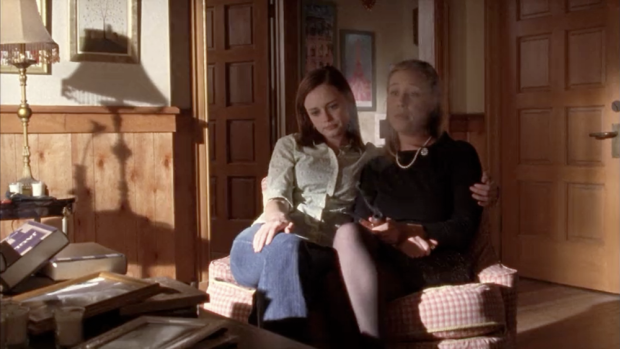
Think about Rory Gilmore, who is brilliant and kind and fiercely loyal, and who somehow finds herself dating a string of immature man-children who are dull and mean and unfaithful, who treat her more like a possession than a person. Think about Bea Santello, languishing in her dying rust belt hometown, managing her father’s hardware store and his debilitating depression, and escaping to nearby college campuses on weekends just to dream of what it would be like to determine her own path. Think about poor, sweet, fictionalized Eduardo Saverin, who put all of his hopes and dreams on hold to make Mark’s dreams a reality, and found himself diluted to 0.03% anyway. (Note that Mark/Eduardo is The Dynamic, just an iteration with a tragic ending.)
The Sweaterboy neither wants nor expects reciprocity. “Of course, I wonder if they love me back, which is, really, besides the point,” writes Richard Siken in The Long and Short of It. “I don’t do it to be adored, I do it because my love keeps getting bigger and that’s what happens.” So being a Sweaterboy is a thankless task — until, that is, someone comes along and says thanks. Until someone comes along and asks, “What do you want?” or, “How can I help?” And then, suddenly, love is not duty or drudgery, but adventure.
Notable Sweaterboys: Abbi Abrams, Bob the Tomato, Cardinal Steven, Cogsworth, Jack Dawson, Angus Delaney, Drake, Ernie, Rory Gilmore, Grantaire, Kevin Jones, Buzz Lightyear, Mac, Bea Santello, Eduardo Saverin, Julianne “Julie” Steffans, Trish Walker, John Watson, Kanye West, James Wilson
To learn which half of The Dynamic you are, take this handy quiz.
For more information, visit One True Dynamic.
Correction: An earlier version of this article stated that Eduardo’s shares were diluted to 0.01%. In fact, his shares were diluted to 0.03%. The Niche regrets the error.
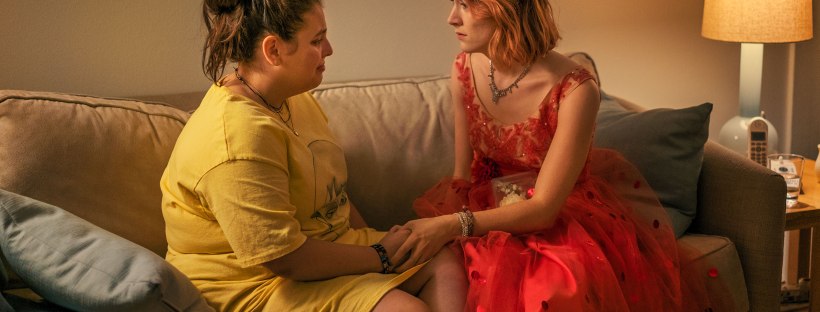
i’m not being hyperbolic when i say The Dynamic has fundamentally changed my worldview. thank you for that
LikeLiked by 1 person
finally i can tell all my friends that all their favorite ships are based in queer experiences. thank u for this historic documentation
LikeLiked by 1 person
pey i appreciate the professional version of this but we have to acknowledge the onetruedynamic’s trashy origins in a comparison of sherlock holmes with candelabra/candlestick and buzz/woody
LikeLiked by 1 person
Wow, yes, thank you, I will amend the post.
LikeLike
well written and informative! thanks for publishing this and including some people in this little world you and your pals have crafted: I really love this great way to explain/explore certain relationships. it just makes sense somehow!
p.s. I started watching Gilmore girls last week and have only been able to make it on the hopes of Paris and Rory interacting…. I’m only at season 2. pls tell me they are together more later?
LikeLike
frankly the only way i could make it through gilmore girls was by finding a script website, ctrl+f’ing for paris, and then skipping ahead to her scenes and her scenes only… lots of good stuff in season 3 iirc
LikeLike
I’m very confused about Grantaire’s inclusion with the Sweaterboys. Isn’t he an actual Tortured Artists who is semi constantly drunk? I’d been seeing him and Enjolras as two sides of the Absolute Nightmare coin? I guess my question really becomes: Must a Sweaterboy’s comfortable pattern be one that would get him social esteem or merely fits a well understood framework?
LikeLike
This explains How the mouth changes its shape and it explains Gnomon and it explains the relationship between the two in my head, and now everything makes sense
LikeLike
milo and otis fit the dynamic
LikeLiked by 2 people
This is the most affirming thing I’ve ever had the pleasure of reading
LikeLike
I love this way of thinking about relationships, but I don’t understand why you didn’t call the Sweaterboy just The Sweater. It’s…right there. Or The Sweaterchild, if you still want to emphasize personhood and innocence, but get rid of the gendered aspect.
Also, I feel like Sweater/Sweater and Nightmare/Nightmare relationships require further investigation.
LikeLike
incredible. life changing. exactly what i’ve needed.
also, a few more absolute nightmare/sweaterboy combos for consideration:
Ruby Thewes/Ada Monroe from Cold Mountain, Frankie and Grace, Thorin Oakenshield/Bilbo Baggins, Jay Gatsby/Nick Caraway, Fox Mulder/Dana Scully, Chirrut Imwe/Baze Malbus, possibly Valkyrie/Thor?
LikeLike
YES oh my god i have been trying to explain to my sister why Gus and Shawn in Psych are SO GODDAMN QUEER but couldn’t figure out the right way to explain it to her and The Dynamic is JUST PERFECT THANK YOU
LikeLike
You know that’s right!! I’m re-watching psych and randomly remembered this article and was thinking about Shawn and Gus the whole time and then I see your comment!! Absolute nightmare Shawn and sweaterboy Gus. Truly iconic. Leave it to the Niche to rationalize the queerness we detect in the oppressive heteronormativity of 2000’s TV lmao 🙂
LikeLike
Okay Moomin and Snufkin are the PERFECT example of the dynamic. god i love it
LikeLike
When I got to “Larry the Cucumber” I had to put my phone down and laugh silently until I was calm enough to continue.
LikeLike
also consider Hamlet/Horatio and Frodo/Sam as PERFECT example of The Dynamic
LikeLike
THANK YOU i was thinking the very same thing!
LikeLike